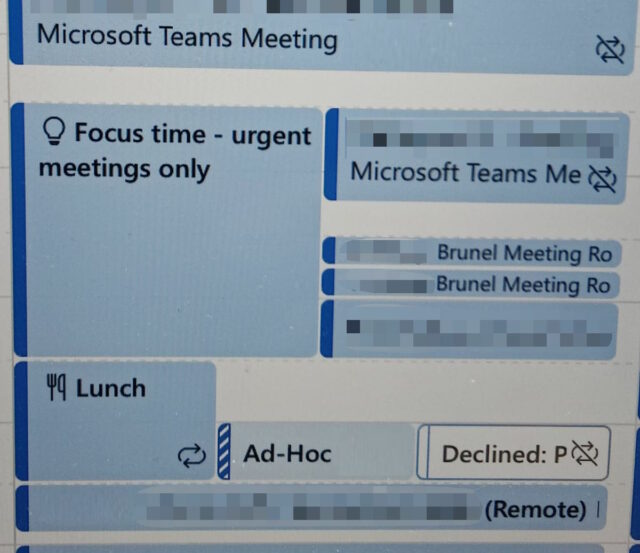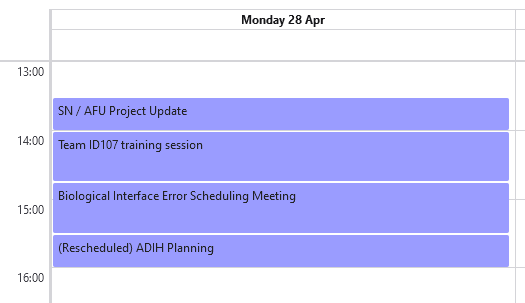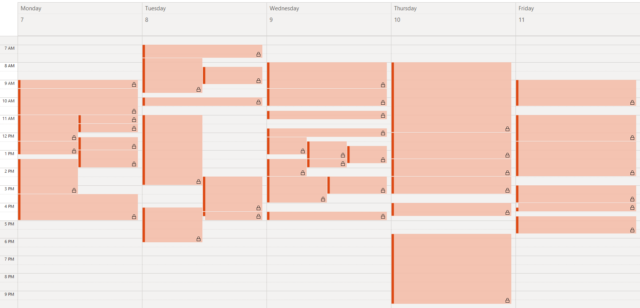Focus time is great
I’m a big fan of blocking out uninterrupted time on your work calendar for focus activities, even if you don’t have a specific focus task to fill them with.
It can be enough to simple know that, for example, you’ve got a 2-hour slot every Friday morning that you can dedicate to whatever focus-demanding task you’ve got that week, whether it’s a deep debugging session, self-guided training and development activities, or finally finishing that paper that’s just slightly lower priority than everything else on your plate.

I appreciate that my colleagues respect that blocked period: I almost never receive meeting requests in that time. That’s probably because most people, particularly because we’re in such a multi-timezone company, use their calendar’s “find a suitable time for everybody” tool to find the best time for everyone and it sees that I’m “busy” and doesn’t suggest it.
If somebody does schedule a meeting that clashes with that block then, well, it’s probably pretty urgent!
But it turns out this strategy doesn’t work for everybody:

My partner recently showed me a portion of her calendar, observing that her scheduled focus time had been overshadowed by four subsequently-created meetings that clashed with it. Four!
Maybe that’s an exception and this particular occasion really did call for a stack of back-to-back urgent meetings. Maybe everything was on fire. But whether or not this particular occasion is representative for my partner, I’ve spoken to other friends who express the same experience: if they block out explicit non-meeting time on their calendar, they get meeting requests for that time anyway. At many employers, “focus time” activities don’t seem to be widely-respected.
Maybe your workplace is the same. The correct solution probably involves a cultural shift: a company-wide declaration in favour of focus time as a valuable productivity tool (which it is), possibly coupled with recommendations about how to schedule them sensitively, e.g. perhaps recommending a couple of periods in which they ought to be scheduled.
But for a moment, let’s consider a different option:
A silly solution?
Does your work culture doesn’t respect scheduled focus time but does respect scheduled meetings? This might seem to be the case in the picture above: note that the meetings that clash with the focus time don’t clash with one another but tessellate nicely. Perhaps you need… fake meetings.

Of course, creating fake meetings just so you can get some work done is actually creating more work. Wouldn’t it be better if there were some kind of service that could do it for you?
Here’s the idea: a web service that exposes an API endpoint. You start by specifying a few things about the calendar you’d like to fill, for example:
- What days/times you’d like to fill with “focus time”?
- What industry you work in, to help making convincing (but generic) event names?
- Whether you’d like the entire block consistently filled, or occasional small-but-useless gaps of up to 15 minutes inserted between them?
This results in a URL containing those parameters. Accessing that URL yields an iCalendar feed containing those meetings. All you need to do is get your calendar software to subscribe to those events and they’ll appear in your calendar, “filling” your time.
So long as your iCalendar feed subscription refreshes often enough, you could even have an option to enable the events to self-delete e.g. 15 minutes before their start time, so that you don’t panic when your meeting notification pops up right before they “start”!
This is the bit where you’re expecting me to tell you I made a thing
Normally, you’d expect me to pull the covers off some hilarious domain name I’ve chosen and reveal exactly the service I describe, but I’m not doing that today. There’s a few reasons for that:

- Firstly, I’ve got
enoughtoo many pointless personal/side projects on the go already1. I don’t need another distraction. - Secondly, it turns out others have already done 90% of the work. This open-source project runs locally and fills calendars with (unnamed, private) blocks of varying lengths. This iOS app does almost exactly what I described, albeit in an ad-hoc rather than fully-automated way. There’s no point me just doing the last 10% just to make a joke work.
- And thirdly: while I searched for existing tools I discovered a significant number of people who confess online to creating fake meetings in their calendars! While some of these do so for reasons like those I describe – i.e. to block out time and get more work done in an environment that doesn’t respect them simply blocking-out time – a lot of folks admit to doing it just to “look busy”. That could be either the employee slacking off, or perhaps having to work around a manager with a presenteeism/input-measurement based outlook (which is a terrible way to manage people). But either way: it’s a depressing reason to write software.
Nope
So yeah: I’m not going down that avenue.
But maybe if you’re in a field where you’d benefit from it, try blocking out some focus time in your calendar. I think it’s a fantastic idea, and I love that I’m employed somewhere that I can do so and it works out.
Or if you’ve tried that and discovered that your workplace culture doesn’t respect it – if colleagues routinely book meetings into reserved spaces – maybe you should try fake meetings and see if they’re any better-respected. But I’m afraid I can’t help you with that.
Footnotes
1 Consider, for example, how I’m trying to take a photo of my dog, with her tongue stuck out, every day of this month.
0 comments